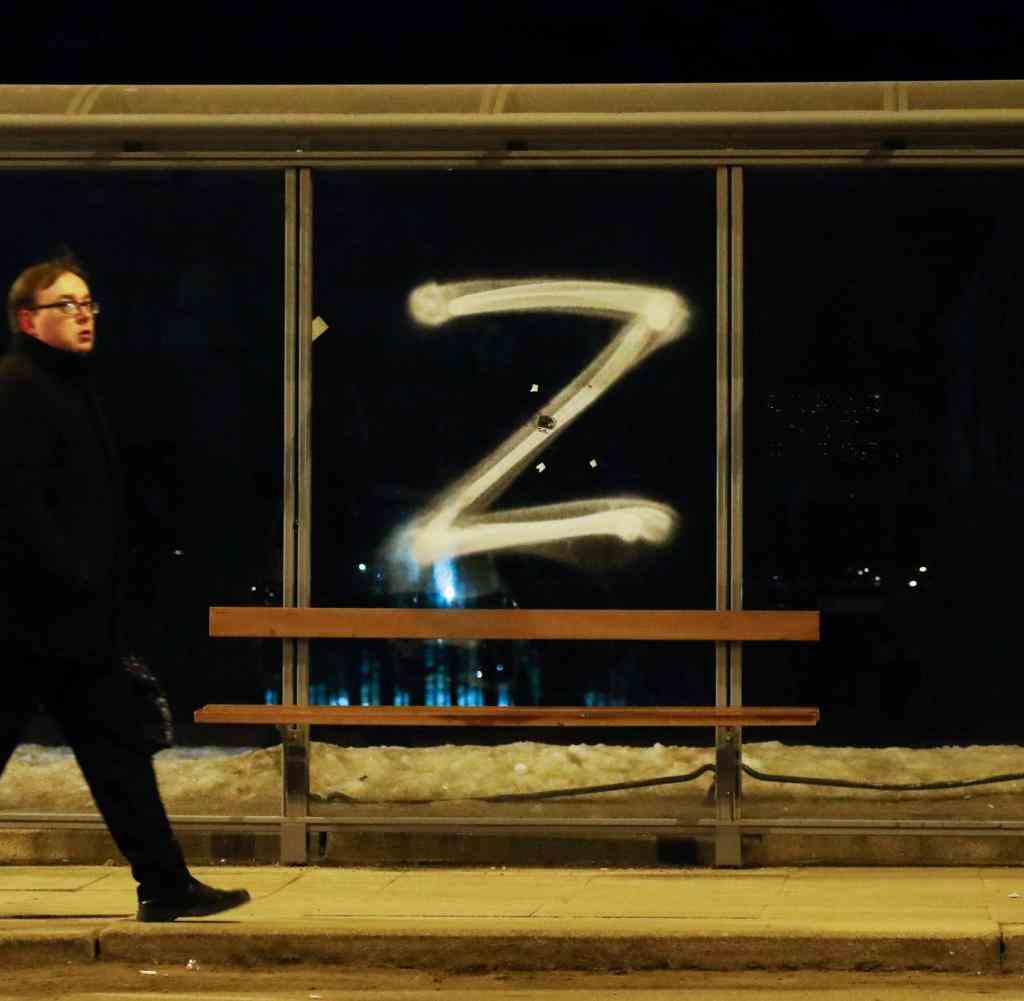Federal states take action against Russian “Z” symbol

A man walks past the ‘Z’ symbol painted on a bus stop in support of Russian forces in Saint Petersburg
Source: REUTERS
The “Z” is considered a sign of approval for the Russian war against Ukraine. Lower Saxony and Bavaria are already taking action. The public use of the symbol, for example during demonstrations, is now punishable there. NRW and Berlin are now following suit and are examining the consequences under criminal law.
IMore and more federal states are taking action against the “Z” symbol, the symbol of support for the Russian army in the Ukraine war. Lower Saxony and Bavaria ordered that the public use of the symbol in Germany, for example in demonstrations, was punishable. Up to three years imprisonment or a fine are possible. North Rhine-Westphalia announced on Sunday that it would examine criminal consequences.
Berlin is also taking action against the “Z” symbol. “If the context of the war is created with the use of the white Z, as can be seen on the Russian military vehicles, then of course that means advocating a war of aggression,” said Interior Senator Iris Spranger (SPD). the “Tagesspiegel” from Monday. “That would be a punishable offence, so we’ll intervene immediately.”
In Russia, the Latin letter “Z” appears in many places in public space. It is easy to recognize as a symbol because it does not exist in the Cyrillic alphabet. Numerous Russian military vehicles also bear the “Z”.
The “Z” is shown on buildings, cars or clothing to show approval of Russia’s war against Ukraine, the Interior Ministry said in Hanover. There have also been “corresponding observations” in Lower Saxony.
Lower Saxony’s Interior Minister Boris Pistorius (SPD) explained that anyone who uses the “Z” symbol to publicly express approval of Russian President Vladimir Putin’s war of aggression against Ukraine must expect criminal consequences in Lower Saxony. “It is absolutely incomprehensible to me how the stylized ‘Z’ can be used even here to condone these crimes.”
Bavaria’s Minister of Justice Georg Eisenreich (CSU) warned: “Sympathizers who publicly use the ‘Z’ mark of the Russian armed forces in Bavaria” could be liable to prosecution for approving criminal offences.
Reul: “I don’t understand it at all”
The basis for the actions of the federal states is paragraph 140 number two of the Criminal Code: According to this, behavior is punishable if it is to be understood as publicly flaunted approval of aggressive wars and is likely to disturb public peace. Eisenreich also mentioned Paragraph 13 of the International Criminal Code, which deals with “crimes of aggression”. “We do not accept international crimes being condoned,” the minister said.
North Rhine-Westphalia’s Interior Minister Herbert Reul (CDU) told the “Rheinische Post” (Monday edition) that Russia’s illegal war of aggression in Ukraine was causing “unspeakable” suffering. “I have absolutely no understanding of how to condone or condone these crimes.”
The white “Z” is often seen on Russian military vehicles during combat operations in Ukraine. The sign is now also shown outside the war zone to express approval for the Russian attack.
The letter appeared a few weeks ago on Russian tanks advancing towards Ukraine. The Russian military equipment was probably marked in this way so that the soldiers could distinguish it from Ukrainian ones. Whether the Latin letter also has a meaning in Russian is not certain.
One theory says that it could be the first letter of the word “Zapad” (“West”). This could mean the direction of movement of the troops or that they are tanks from western parts of the country. Some also see a nod to Ukrainian President Volodymyr Zelenskyy, whose surname is transliterated with a “Z” in many languages.
“Kick-off Politics” is WELT’s daily news podcast. The most important topic analyzed by WELT editors and the dates of the day. Subscribe to the podcast at Spotify, Apple Podcasts, Amazon Music or directly via RSS feed.



